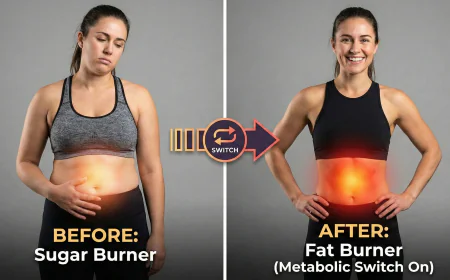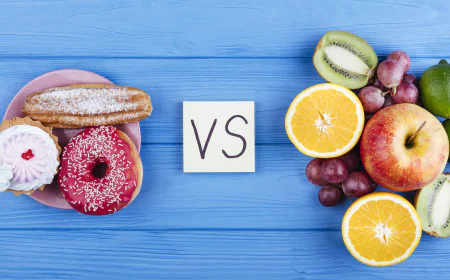Intermittent Fasting for Health: Benefits, How It Works & How to Start
Discover how intermittent fasting improves your health naturally. Learn the science, benefits, and how to start intermittent fasting safely for long-term wellness.

Intermittent Fasting for Health: Science-Backed Benefits & How to Start
Intermittent fasting (IF) has quickly grown from a fitness trend into a full-blown wellness movement. While many people start fasting for weight loss, more and more are turning to it for its proven health benefits — including better metabolic function, reduced inflammation, and even longevity.
In this in-depth guide, you’ll learn everything you need to know about intermittent fasting for health, including how it works, its evidence-based benefits, and how to start safely. Let’s unlock the healing power of time-restricted eating.
What Is Intermittent Fasting?
Intermittent fasting is not a diet — it’s an eating pattern that cycles between periods of eating and fasting. The idea is to allow the body time to rest, repair, and regenerate, rather than digesting food around the clock.
| Fasting Schedule | Eating Window | Fasting Duration |
|---|---|---|
| 16:8 | 12 PM–8 PM | 16 hours |
| 15:9 | 10 AM–7 PM | 15 hours |
| 18:6 | 1 PM–7 PM | 18 hours |
| OMAD | 1 Meal/Day | ~23 hours |
| 5:2 | Normal 5 days | 500–600 kcal 2 days |
How Does Intermittent Fasting Improve Health?
- Enhances Metabolic Health: Improves insulin sensitivity and blood sugar regulation. Studies show fasting insulin can drop up to 31% and blood sugar by 3–6%.
- Reduces Inflammation & Oxidative Stress: Lowers inflammatory markers and protects against cellular damage.
- Activates Autophagy: Stimulates cellular cleansing, potentially preventing cancer, Alzheimer’s, and promoting longevity.
- Supports Heart Health: Reduces LDL cholesterol, triglycerides, and blood pressure.
- Improves Brain Function: Increases BDNF for memory, may protect against neurodegeneration, and enhances mental clarity.
- Boosts Immunity: Reduces inflammation, stimulates stem cell and white blood cell regeneration.
Best Intermittent Fasting Schedule for Health
The most sustainable schedules for overall health are 16:8 or 15:9 because they allow ample time for digestion, repair, and nutrient intake while aligning with circadian rhythms.
Example: Eat between 11 AM and 7 PM — fast for the remaining 16 hours (including sleep).
What to Eat During Eating Windows for Better Health
- Lean proteins: chicken, tofu, eggs
- Healthy fats: avocado, nuts, olive oil
- Complex carbs: quinoa, sweet potatoes, legumes
- Colorful veggies & leafy greens
- Hydration: water, green tea, herbal teas
Avoid: processed junk, sugary snacks, sodas, frequent alcohol, trans fats.
Sample Day on a 16:8 Schedule (For Health)
| Time | Activity |
|---|---|
| 8:00 AM | Black coffee or green tea (fasting) |
| 11:00 AM | Break fast: Greek yogurt + chia seeds + berries |
| 2:00 PM | Lunch: Grilled chicken + veggies + brown rice |
| 5:00 PM | Snack: Almonds + herbal tea |
| 7:00 PM | Dinner: Baked salmon + sweet potato + broccoli |
| 7:30 PM–11:00 AM | Fasting window (hydration only) |
Who Should Try & Who Should Avoid
- Ideal For: Adults preventing chronic illness, mild insulin resistance, longevity seekers.
- Avoid/Consult Doctor: Pregnant/breastfeeding women, eating disorder history, Type 1 diabetics, underweight individuals, multiple medications.
Health Results You May Notice
| Week | What You Might Feel |
|---|---|
| Week 1 | Light hunger, better digestion, mental clarity begins |
| Week 2 | Reduced bloating, improved energy, fewer sugar cravings |
| Week 3 | More stable mood, better sleep, mild fat loss |
| Week 4 | Clearer skin, reduced inflammation, stronger focus |
Tips for Success
- Start with 12:12, then shift gradually to 16:8.
- Stay hydrated: aim for 2.5–3 L/day.
- Avoid stress eating during eating windows.
- Break fast with gentle, balanced meals.
- Don’t binge—fasting windows aren’t feast windows.
Conclusion
Intermittent fasting isn't just for fat loss—it’s a powerful tool for whole-body health. Whether your goal is longevity, better digestion, mental clarity, or disease prevention, IF is a sustainable, low-effort way to enhance wellness from the inside out.
Start small, stay consistent, and nourish your body during eating windows. Over time, your body will reward you with energy, balance, and resilience.
"If you have an endomorph body type and struggle with stubborn fat or slow metabolism, this intermittent fasting guide for endomorphs by Lean Fasting is a must-read."
FAQs – Intermittent Fasting for Health
Q1: Can intermittent fasting improve my overall health?
Yes—it supports heart, brain, and metabolic health, and reduces inflammation and aging markers.
Q2: How long does it take to see results?
Some benefits start in the first week (better energy, digestion); deeper results (cellular repair, insulin improvement) appear in 3–6 weeks.
Q3: Is fasting safe for everyone?
Generally yes, but those with medical conditions, pregnant women, or on medications should consult their doctor first.
Q4: Do I need a strict daily schedule?
Consistency helps, but even a flexible IF approach (5 days/week) can improve health markers.
Q5: Can I exercise while fasting?
Yes—light to moderate exercise in a fasted state is safe and may enhance fat burn and hormone balance.































